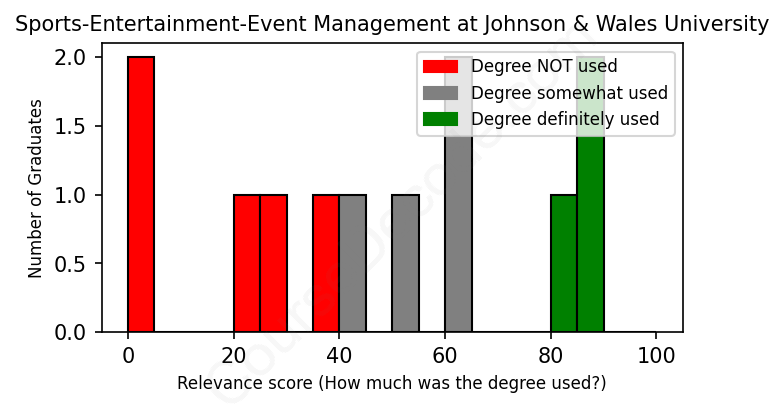
First, some facts. Of the Sports-Entertainment-Event Management graduates from Johnson & Wales University we've analyzed , here's how many have used (or NOT used) their degree in their career:

These are estimates based on AI analysis of 12 LinkedIn profiles (see below).
The verdict? Significantly below average. Overall, with an average relevance score of 48%, Sports-Entertainment-Event Management graduates from Johnson & Wales University have a much lower likelihood (-19%) of finding work in this field compared to the average graduate across all fields:
And for comparison, here's the chart for all profiles we've looked at across all degrees.
Also, after graduating, only 27% of these graduates have pursued further education other than another Bachelor's degree (such as a Masters degree or other), compared to the average across all profiles of 35%. This suggests a Bachelors degree is enough for most Sports-Entertainment-Event Management graduates, and it's normal to look for work straight after graduation.
See the details:
|
Relevance score: 0% We think this person has NOT gone into a career related to their degree. We think this person has NOT gone into a career related to their degree.
DEGREE INFOGraduated in 2013 from Johnson & Wales University with a Bachelor of Science - BS in Sports-Entertainment-Event Management. No other secondary education since. JOB HISTORY SINCE GRADUATIONICQA Amazon Sep 2021 - Present ABOUTNo information provided. |
The top 10 most common jobs done by the graduates we've analyzed (ranked most common to least) are:
From the analysis, it looks like many graduates from the Sports-Entertainment-Event Management program at Johnson & Wales University have ended up in a variety of job roles, but not all of these are super relevant to their degree. A common theme is that a lot of folks leaned towards careers in human resources, sales, and hospitality. While some of these positions, like event coordinators and marketing roles, do directly apply event management skills, others like sales managers and HR positions focus more on customer service or employee relations, which aren't the main focus of the degree.
Overall, it seems like a significant portion of graduates have found work that somewhat relates to their studies, mainly in event planning and customer management roles. However, a good number have taken paths that stray pretty far from the core competencies of Sports-Entertainment-Event Management. So, while the degree offers a solid foundation for many related careers, it doesn't always guarantee a direct connection to event management jobs, especially considering the variety of roles folks have taken. Keep this in mind if you're thinking about the program; it's great for gaining various transferable skills, even if the jobs afterward look a bit different than you might expect!
Here is a visual representation of the most common words in job titles for Sports-Entertainment-Event Management graduates (this is across all Sports-Entertainment-Event Management graduates we've analyzed, not just those who went to Johnson & Wales University):

Looking at the career trajectories of graduates from Johnson & Wales University with a degree in Sports-Entertainment-Event Management, there's a mixed bag of experiences. Many graduates kick off their careers in entry-level roles related to event management, hospitality, or sales, often taking on positions like event assistants, sales coordinators, or even intern roles in marketing or event planning shortly after graduation. This suggests that many are indeed getting their feet wet in relevant fields, which is a good sign for those drawn to this degree.
However, as we fast forward 5 to 10 years down the line, we see a mix of success and divergence from the field chosen. Some move up the ladder in event management, transitioning into roles with more responsibility such as event coordinators or managers, while others pivot entirely, finding themselves in roles tied to hospitality and human resources instead. For instance, a notable trend is graduates moving into HR positions, which isn't directly related to Sports-Entertainment-Event Management. This could mean a few folks are finding their niche in people management rather than the events themselves. Overall, while some graduates land fulfilling careers within the events and entertainment sectors, others seem to drift away from their original path, indicating a varied experience that could reflect individual choices or the job market's demands. So, there are definitely success stories, but it's also clear that some graduates may not be staying closely aligned with their field of study over the long term.
Honestly, a Bachelor's degree in Sports-Entertainment-Event Management, whether at Johnson & Wales University or anywhere else, tends to be on the easier side compared to some other majors. Sure, you’ll have your fair share of projects, group work, and the occasional exam, but a lot of the coursework revolves around fun topics like planning events and understanding the industry. You’ll be learning through hands-on experiences and maybe even some internships, which can make it more engaging. Just like any degree, it requires effort and dedication, but if you’re passionate about sports and events, you’ll likely find it pretty manageable!
Most commonly, in the LinkedIn profiles we've looked at, it takes people 4 years to finish a Bachelor degree in Sports-Entertainment-Event Management.
It looks like these graduates from Johnson & Wales University have had a pretty mixed bag when it comes to their earnings. Some, like the HR-related grads, have steadily climbed the ladder in relatively stable fields, which typically pays well, especially in managerial roles—so they might be doing okay financially. On the other hand, those in event management or hospitality seem to have more ups and downs, with roles that may not always lead to high salaries right off the bat and can be pretty fluctuating. A few have even started their own businesses, which could either be a hit or miss in terms of income. Overall, while some of them might be raking it in, it seems like others are just making a decent living or still working their way up the income scale. It all depends on their specific career paths and how they’ve evolved post-graduation!
Here is a visual representation of the most common words seen in the "about" section of LinkedIn profiles who have a Bachelor degree in Sports-Entertainment-Event Management (this is across all Sports-Entertainment-Event Management graduates we've analyzed, not just those who went to Johnson & Wales University). This may or may not be useful:

Here are all colleges offering a Bachelor degree in Sports-Entertainment-Event Management (ordered by the average relevance score of their Sports-Entertainment-Event Management graduates, best to worst) where we have analyzed at least 10 of their graduates:
| College | Score | Count |
|---|---|---|
 Johnson & Wales University Johnson & Wales University
|
48 | 12 |